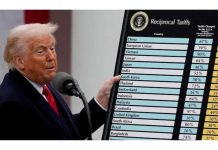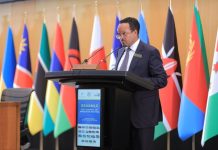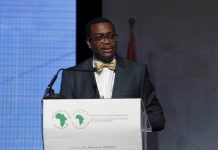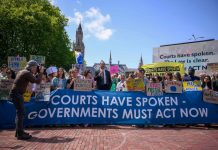By: Austin S Fallah-
Africa-Press – Lesotho. A True Son of the Planet Earth Soil. A Hamline University of Minnesota-trained Public Administration-Public Policy Expert. Make fruitful the invitation extended by the US government through President Donald J. Trump to the five (5) African nations.
In today’s world, we find ourselves at a crossroads. Democracy and good governance are taking hold in many parts of the globe, particularly with the active support of powerful nations like the United States, and developing countries must take note.
They should not be swayed by short-sighted arguments encouraging them to forsake democratic principles for temporary political gain. Instead, they must build strong, lasting relationships with the United States and other democratic nations, fostering a global environment of collaboration and mutual benefit.
This adda argues that democracy, supported by strategic alliances, is crucial for the development and prosperity of all nations, particularly those still struggling to provide for their citizens. We are all part of this shared home called Earth.
As such, it is the responsibility of every person and nation to promote cooperation and understanding while consistently fighting against deceptive internal forces that distract from actual productivity and national welfare.
First and foremost, it is essential to understand the nature of democracy. Democracy is fundamentally about representation, participation, and equality.
In a democratic system, the citizens’ voices are heard, and their rights are protected. It is a system that empowers individuals, allowing them to pursue their aspirations while holding their leaders accountable.
In contrast, authoritarian regimes often stifle progress, suppress dissent, and foster corruption. This is particularly damaging in developing nations, where resources are scarce, and people are already struggling to survive.
Advocating for democracy, therefore, is an essential step toward ensuring that citizens can enjoy fundamental rights such as access to education, healthcare, and employment opportunities.
Moreover, a developing nation’s relationship with the United States can profoundly impact its growth trajectory. The U.S. has the resources, expertise, and influence to help other countries flourish.
Through aid, trade, and investment, the U.S. can help build vital infrastructure, advance technology, and establish education systems that empower young people.
Countries that foster alliances with the U.S. can leverage these resources to improve their conditions and uplift their citizens. This is beneficial not only for the individual countries but also for global stability and prosperity.
To draw on a compelling analogy, “When lions are after a bigger prey, they don’t listen to the barking of little dogs.” This saying emphasizes the importance of focusing on substantial goals and not getting sidetracked by minor distractions from groups that do not care about the suffering people but about their pockets.
In international relations, it suggests that prosperous nations should build alliances that contribute to significant progress rather than engaging with factions that promote stagnation and chaos.
The distractions posed by internal agents with ulterior motives should not deter developing nations from pursuing their potential. Instead, they should prioritize relationships that foster growth and adhere to democratic principles.
Furthermore, it addresses the role of internally confused agents who may undermine progress. Some individuals and groups must thrive in the chaos created by political instability.
These “belly-driven, unschooled, headless, money-eating hyenas” exploit hardships for their gain, calling for populist rallies under the guise of fighting for the masses while revealing their true colors.
These confused so-called agents of change can distract governments from their true objectives, which are to advance the welfare of their citizens. The downtrodden must become wise and discerning, recognizing that the path to progress lies not in following such individuals but in fostering a commitment to democracy and cooperative governance.
The fate of any nation should not be decided by those who are more interested in political power than in the populace’s well-being. Citizens must analyze their leaders’ motivations critically and resist being swept away by grandiose promises that are often hollow.
They must seek out politicians who prioritize accountability, transparency, and genuine service to the public over personal enrichment. In addition to maintaining vigilance against counterfeit leaders, developing nations must cultivate a sense of agency and national identity.
They must invest in their people, encourage education, facilitate social enterprises, and create an environment where innovation can thrive. A country that empowers its citizens can adequately resist subversive elements that threaten democratic values and principles.
Moreover, consistency in the fight against unpatriotic actions is crucial. “Water breaks rocks not because of its strength but its consistency.” This statement underscores the importance of persistent effort in achieving long-term goals.
Consistent engagement in non-hooliganism, noisemaking, empty and outdated slogans, rhetoric of civic activities, campaigns for justice, and advocacy for rights can gradually dismantle entrenched systems of corruption and tyranny.
Advocacy for democracy is not a one-time event but a continuous journey that requires dedication, resilience, and collective participation. The path for developing nations should be clear.
They must commit to democracy while fostering strategic alliances with established democracies like the United States. In a continually evolving world, nations need to prioritize values that promote the welfare of their citizens over momentary political gain.
It is time for the global community, especially the downtrodden, to embrace wisdom and to seek alliances that encourage empowerment, stability, and prosperity.
The fight for good governance and meaningful progress is not without challenges, but those challenges can be overcome through consistency, dedication, and a united front.
By standing firm in their democratic values, while forming strong international relationships, nations can ensure a brighter future for themselves and every air-breathing human being on this Earth. It is time to rise above the distractions and focus on the substantial goals that truly matter for humanity’s progress.
Source: Liberia news The New Dawn Liberia
For More News And Analysis About Lesotho Follow Africa-Press






